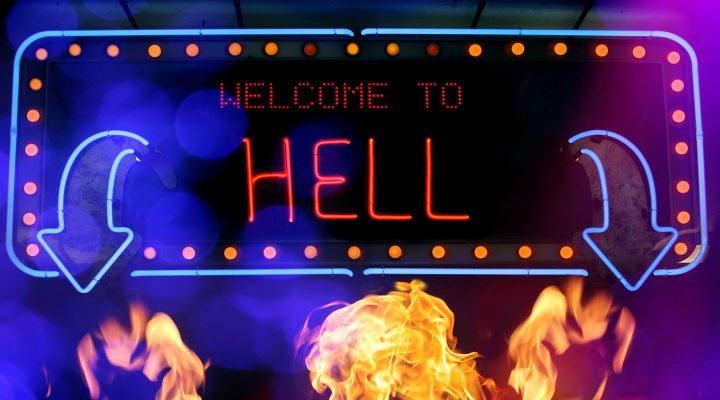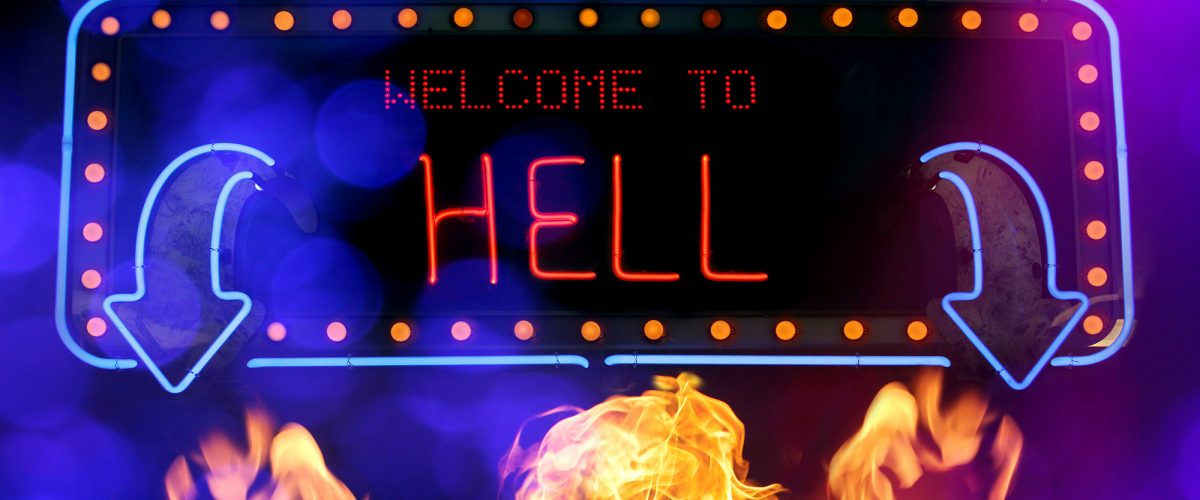A few weeks ago, a friend texted me a satirical religious “advertisement.” The ad featured an image of a kind and loving Jesus with a big red heart on his chest. The title of the ad read: “TRADE OFFER.” The trade offer from Jesus said:
- I receive: You have to worship me.
- You receive: I won’t burn you in hell.
At the bottom of the ad, my friend attached an emoji of a flaming fire. He added, “I thought you might be interested in this lovely offer from Jesus!”
Although meant to be humorous, this sarcastic “trade offer” raises an important theological question. What kind of deity would eternally torture people in agonizing flames of hell? Certainly not a God worthy of love, respect, devotion and service. For those who haven’t already rejected this barbaric theology, it’s time to raze hell once and for all.
Hellfire and damnation
Although I grew up in a non-churched family, I landed in a Southern Baptist church at the age of 15. One year later, several of my youth group friends and I attended a revival meeting at a sister congregation. That’s where I heard my first “hellfire and damnation” sermon.

Martin Thielen
The evangelist preached from the parable of Lazarus and the rich man. Instead of preaching on the point of the parable — compassion for the poor and marginalized — he focused on eternal torment in hell. For nearly an hour, he spoke about the horrific eternal fiery punishment that awaited everyone who failed to accept Jesus as Lord and Savior. He concluded with an extended story about a man who got trapped in his car during an automobile accident.
Before first responders could free him from the wreckage, his car caught on fire, and he died screaming in unbearable agony as the flames engulfed him. That fate, the preacher said, awaits all people who die without faith in Jesus. The difference is that their pain will be eternal, not temporal.
As we drove home from the revival meeting, I discovered my friends, like me, felt deeply disturbed by the sermon. However, their concerns proved wildly different from mine. They worried about the eternal destiny of their lost friends and strategized ways to save them from the flames of hell. I, on the other hand, felt traumatized over the idea of a cruel and sadistic God who eternally tortured people for holding erroneous doctrines about Jesus.
“Rather than rejecting my faith, I rejected belief in a literal hell.”
Even at age 16, I knew I could not love and serve such a violent and vicious God. So, rather than rejecting my faith, I rejected belief in a literal hell.
Is God worse than ISIS terrorists?
Years ago, I read a news story about the unimaginable cruelty of ISIS terrorists, including sexual violence, chopping off hands, death by stoning, beheadings. In one documented incident, Islamic State soldiers placed one of their prisoners in a cage, saturated him with gasoline, set him on fire, cheered as he died in agony, and then posted a video of the execution online. It was one of the most depraved acts of human cruelty I’ve ever heard of.
But if hell is a literal reality, God is far worse than those ISIS terrorists. They only burn their victims for a few minutes until death brings welcome relief. If the traditional doctrine of hell is true, God burns his victims in agony for all eternity, with no hope of relief, ever, world without end.
Some orthodox believers argue the flames of hell should not be taken literally since hell is also described as a place of utter darkness. The point is, they argue, hell is a bad place, a place where God is not to be found, and a place where there is no hope.
Literal flames or not, the traditional doctrine of eternal punishment should be an unacceptable belief for followers of the one who ate with sinners, blessed little children and forgave his executioners.
Hell and justice
Traditionalists often defend the doctrine of hell by affirming that God is not only loving but just. They argue that a God of justice requires the punishment of hell.
However, hell is anything but just. Instead, hell is the most flagrant violation of proportional punishment ever devised.
“Hell is the most flagrant violation of proportional punishment ever devised.”
If a person is caught stealing a $20 item from Walmart, the courts don’t sentence the culprit to life in prison or the death penalty. That would be grossly disproportionate punishment. Even if people hold heretical beliefs their entire lifetimes or live horribly sinful lives for 70 or 80 years, it would not be just to punish them for all eternity.
Eternal punishment for temporal crimes, however bad, would not be justice but unmitigated cruelty by a malevolent deity.
Hell and the Bible
Some conservative believers argue that the Bible clearly teaches the doctrine of hell. However, we must be careful about that claim.
In truth, Scripture is both incomplete and inconsistent on the topic of hell, with a wide variety of interpretations. For example, in Jesus’ day, the word “hell” (Gehenna) referred to a garbage dump on the outskirts of Jerusalem. Jesus took that vivid familiar image and used it in parabolic and metaphorical ways. Such references do not need to be taken literally.
It’s beyond the scope of this brief post to dive deeply into the biblical and theological issues surrounding the complex subject of hell. However, if you want a thoughtful and thorough overview of this doctrine, I highly recommend Sharon Baker’s book, Razing Hell: Rethinking Everything You’ve Been Taught about God’s Wrath and Judgment. I borrowed her book title for the title of this post and want to give her full credit for the creative wordplay.
‘Pastor, you need to preach more sermons on hell’
Many years ago, during my first full-time, post-seminary pastorate in the Southern Baptist Convention, one of the deacons regularly complained that I didn’t preach enough on hell. I responded by telling him I consistently prayed for God’s guidance on what to preach and that so far in that particular pastorate I had not felt led to preach on that subject.
And while that was the truth, it wasn’t the entire truth. Had I been more courageous, I would have told him I never had preached a sermon on hell and never would. Why not? Because hell is a vile, anti-Christian doctrine that depicts God as a cruel, vengeful, violent, psychopathic and sadistic terrorist. It’s totally incongruent with the loving, merciful and forgiving spirit of God revealed in Jesus. And it’s a grossly unjust and disproportional punishment.
Finally, if I’d had the courage, I would have told him the notion of hell should be forever jettisoned from Christian thought and theology, including his own. He would not have liked that answer. And that response might have cost me my job. But it would have been the truth. And it still is.
Martin Thielen, a retired minister, is the creator and author of www.DoubtersParish.com.
Related articles:
Most Americans believe in heaven or hell, but their ideas aren’t always biblical | Analysis by Mallory Challis
Heaven-or-hell theology may be simple, but it is neither biblical nor morally defensible. What’s the alternative? | Opinion by Alan Bean


